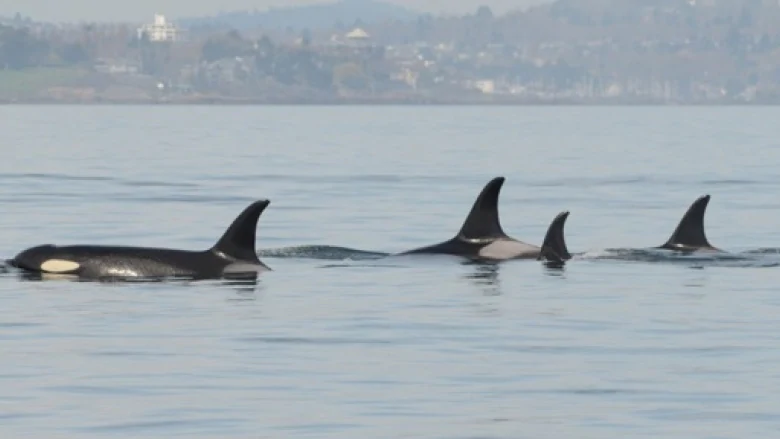The young killer whale known as J50 appears lethargic and has lost about 20 per cent of her body weight
The story of the southern resident J-pod orcas, and the mother mourning her dead calf, has drawn attention from around the world.
Now, one of the other calves in the same pod is starving, and the U.S. National Oceanic and Atmospheric Administration is working with Fisheries and Oceans Canada on a plan to save it.
J-50 is a four-year-old orca who is showing signs of malnourishment and lethargy, according to Michael Milstein, a public affairs officer with NOAA, who has been following the pod closely since the news of the calf's death.
There are 75 endangered southern resident killer whales remaining in the area that swim the straits and sounds around the the coastal waters from British Columbia to Northern California, making the health of this whale a very urgent issue, Millstein told The Early Edition's Stephen Quinn.
The DFO did introduce new rules in July for whale watching businesses, which include fines of up to $500,000 for boats that fail to stay 200 metres away from killer whales on the West Coast in an effort to protect the endangered orcas.
But he said J-50 is their priority right now, and they're looking at both short and long term measures to help the whales.
Milstein says scientists are considering a plan that would involve feeding the underweight killer whale chinook salmon with medication in it — a strategy the U.S. department believes hasn't been used before.
"We have no idea at this point if an attempt to provide food or medication in the form of food, would be successful," he said.
"We want to go into this with our eyes open, in a situation where we could create a whale that's dependent on us for food, that's not going to do anyone any good."
A lack of food is only one of the reasons southern resident whales are struggling, said Millstein, who mentioned noise from marine traffic and pollution as factors which strongly impact the orcas' health.
"We really need to think about those other factors because noise, for instance, even if there is food, if there's too much noise and they can't use their echolocation to find that food, it doesn't make a whole lot of difference."
Milstein says the first step is observing the whale to pinpoint her ailments with drone footage and by collecting fecal and breath samples from her blow hole.
He says scientists are out on the water today trying to find the pod but are having trouble as it was last seen heading toward open water.

